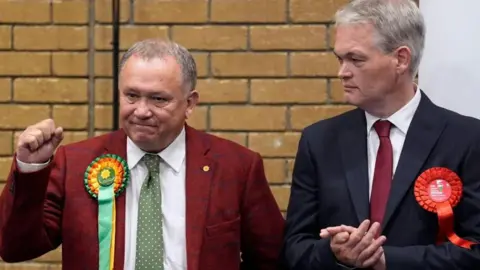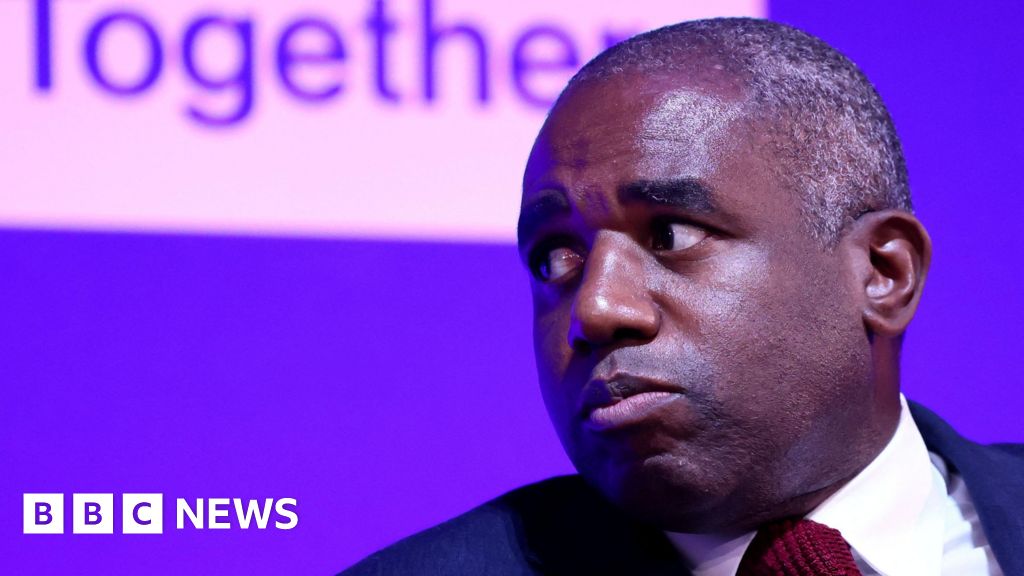Emilia BelliWales Westminster correspondent
 PA Media
PA MediaKey elections next May could be a “tipping point” for a prime minister “absolutely delusional” about the likely outcome in Wales, according to some Labour figures.
Polls will take place in Wales, Scotland and some English councils, but the reverberations of the result will be felt in Downing Street.
One Labour figure warned Sir Keir Starmer had “lost the room” with “sensible middle-ground people like me” and “if his days aren’t numbered as prime minister, I don’t know where we go”.
A UK Labour spokesperson said the prime minister was “laser focussed” on fixing the “broken economy” inherited from the previous Conservative government.
In the aftermath of Labour coming third in the Caerphilly by-election, its first parliamentary defeat there in 100 years, Prime Minister Sir Keir Starmer said his party “clearly need to do much more”.
But there are concerns among some Welsh MPs that the resounding defeat could be repeated at the ballot box in May.
While several in the party point to a cocktail of factors for the loss, including tactical voting to keep out Reform, the Welsh government’s legacy after 26 years in power, and local council disputes, some say Keir Starmer’s leadership also came up.
There is a recognition within the party that the communication around winter fuel and proposed welfare cuts was mismanaged and has damaged the party, drowning out successes they would like to point to.
The government will also have to persuade the public that it is taking the right choices against a difficult economic backdrop, and with tax rises likely in the budget on 26 November.
Some Welsh Labour MPs would like to see the reversal of taxes on family farms, and the lifting of the two-child benefit cap to appeal to voters.
One figure in the parliamentary party said a process of reflection is now underway ahead of “undoubtedly the toughest most important election we’ve ever faced”, and that the by-election result “gives it impetus” for the government to focus on Wales.
In the week following the loss, Deputy Prime Minister David Lammy met the wider Labour Party, while chair Anna Turley met Welsh MPs to discuss the result.
The prime minister was seen mingling with Welsh MPs on the estate and No 10’s chief of staff, Morgan McSweeney, also met Welsh backbenchers to hear concerns.
A government source said “they recognise they need to do more outreach” with Welsh MPs and there is more pushing on Welsh issues at cabinet.
However they added there is also a “realisation things won’t be there in time for May”.
 PA Media
PA MediaOne senior Labour source said, however, that the team around the prime minister remains “absolutely delusional” about the outcome of the Senedd election.
“Wales is not important to them,” they said, adding they think losing Wales “will not be a disaster” as they have recovered from losing Scotland in the past.
They said a change in direction at the top of the party is needed with the focus moving from addressing Reform UK talking points to finding a coherent Labour narrative.
“It needs to be a definite pivot, not a little shift,” they said.
But they were not confident Starmer was the right person to do it.
“I think May is definitely the tipping point for his leadership,” they said, “he’ll be limping on until then, but people will be organising”.
Another said the prime minister is a “top-down ivory tower leader” who is late to react to early warning signs like Caerphilly.
They describe the defences MPs are expected to give in parliament of the UK government’s record in Wales as “terrible”.
“Sensible middle-ground people like me are done, he’s lost the room” they said, adding, “if his days aren’t numbered as prime minister, I don’t know where we go”.
Another agreed “the big test is going to be May” for Starmer’s leadership, and that the pressure on him had increased since Caerphilly, although they said the result had seemed to make No 10 take Wales more seriously now.
At the same time, some at the top of the party are frustrated at the criticism coming from certain members.
The government source said there had been “a lot of navel-gazing” about what Caerphilly means for Labour, including “people chipping in who didn’t knock a door”.
One source also said that the recent reshuffle, including Shabana Mahmood’s appointment as home secretary, shows the government is getting a grip on issues important to Welsh voters, like small boats.
Another party figure said part of the desire to change leadership is “fatalism” and “nervousness” typical of Labour, but that Caerphilly was “not a referendum on Keir Starmer” and to move against him would be a mistake.
The senior source is more “fatalistic”, in their assessment on whether Labour could win the campaign in Wales next spring.
“My heart says yes we can, but my head says no we can’t.”
‘Laser focussed’
A UK Labour spokesperson said: “After 14 years of Tory chaos, a botched Brexit, and damaging austerity – we know families across Wales are struggling.”
“We inherited a broken economy and the prime minister is laser focussed on fixing this.
“The Welsh government received the largest settlement in the history of devolution to help deliver for families, bring down waiting lists, and invest in railways – but we recognise there is a long way to go before people feel the benefit of this,” they added.
However, it’s just six months until polling day.
While the prime minister’s performance is only one element of how Labour will inevitably be judged at the devolved election in May, it is becoming clearer that the odds of his survival will be influenced by the outcome.



